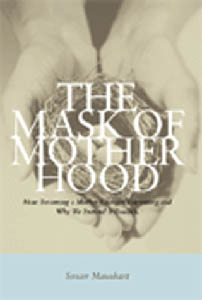Bethan Roberts
Often witty and certainly subversive, The Mask of Motherhood is, as the blurb puts it, not a ‘how to’ book but a ‘how it really is’ book. I’m not sure what this cliché actually means (how it is for who, exactly?), but it’s true that Maushart quickly gets to work, debunking all the romantic myths of motherhood she can think of.
In case you didn’t know (and, I must admit, I wasn’t wholly aware of the realities), here goes: childbirth can be excruciatingly painful, full of gore and "volcanic eruptions"; breast-feeding can hurt like hell, you’ll probably bleed and blister and your boobs will droop; new-born babies will drive you half-insane from sleep-deprivation (although you’ll be too ashamed to admit that your little darling never sleeps); men still turn into ‘stuporman’ on baby’s arrival, and after the birth you might go off sex for years. What’s more, Maushart argues, it’s self-defeating to pretend otherwise. In donning the serene "mask of motherhood" – an attempt to appear in control and coping just fine, thank you – the ‘juggling act’ of working motherhood becomes a masochistic road to frustration, weariness and even mental illness.
Maushart is particularly incisive on the problems facing older working mothers. She argues that, far from being the wised up generation we might believe ourselves to be, we are in no way prepared for the shock of facing 24 hour care of a helpless being. And what’s worse, we feel guilty for not being prepared, and blame ourselves. This is especially the case for high achieving women, who will be used to choices, to success, to being in control. Suddenly, there is no control, just reaction to a constantly needy child. And, of course, there’s the breast feeding.

Maushart deconstructs the ‘breast is best’ myth with relish, chastising the current generation for being absurdly puritanical about the whole process. She recounts horror stories of women in a constant agony to prove their ability to breast feed, literally blistered by the fear that the ‘Milk Police’ will catch them being ‘artificial’ mothers. On this one, I’m firmly with my own mum: if it hurts, give the bleeder the bottle.
Throughout the book there is a nagging lack of suggestions as to how we might improve the situation, apart from the rather Oprah-esque appeal for us to talk to our mothers and ‘sisters’ about it. This is, of course, good advice – but do we really need to hear it again? Maushart is also apparently not interested in mothers who fall outside her sphere if experience; there’s scant mention of anyone not heterosexual or middle class.
However, this sort of publication – a serious piece of research aimed at the non-academic market – is a welcome addition in the face of the relentless, brainless optimism of most women’s magazines and daytime television. Yes! they cry, have a perfect baby/fulfilling career/ideal partner/great body in just seven days! In this climate of constant pressure for women to achieve the impossible, it’s always a relief to hear a dissenting voice and be reminded that it’s quite normal to feel ambivalent or even negative about motherhood, and that it’s all right to say so.
